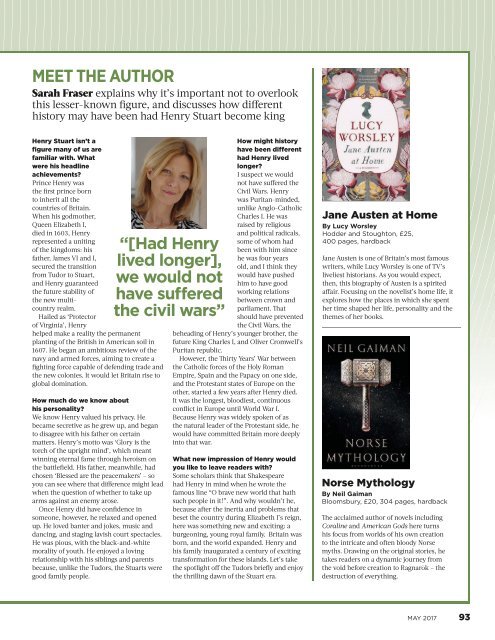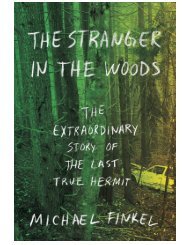You also want an ePaper? Increase the reach of your titles
YUMPU automatically turns print PDFs into web optimized ePapers that Google loves.
MEET THE AUTHOR<br />
Sarah Fraser explains why it’s important not to overlook<br />
this lesser-known figure, and discusses how different<br />
history may have been had Henry Stuart become king<br />
Henry Stuart isn’t a<br />
figure many of us are<br />
familiar with. What<br />
were his headline<br />
achievements?<br />
Prince Henry was<br />
the first prince born<br />
to inherit all the<br />
countries of Britain.<br />
When his godmother,<br />
Queen Elizabeth I,<br />
died in 1603, Henry<br />
represented a uniting<br />
of the kingdoms: his<br />
father, James VI and I,<br />
secured the transition<br />
from Tudor to Stuart,<br />
and Henry guaranteed<br />
the future stability of<br />
the new multicountry<br />
realm.<br />
Hailed as ‘Protector<br />
of Virginia’, Henry<br />
helped make a reality the permanent<br />
planting of the British in American soil in<br />
1607. He began an ambitious review of the<br />
navy and armed forces, aiming to create a<br />
fighting force capable of defending trade and<br />
the new colonies. It would let Britain rise to<br />
global domination.<br />
How much do we know about<br />
his personality?<br />
We know Henry valued his privacy. He<br />
became secretive as he grew up, and began<br />
to disagree with his father on certain<br />
matters. Henry’s motto was ‘Glory is the<br />
torch of the upright mind’, which meant<br />
winning eternal fame through heroism on<br />
the battlefield. His father, meanwhile, had<br />
chosen ‘Blessed are the peacemakers’ – so<br />
you can see where that difference might lead<br />
when the question of whether to take up<br />
arms against an enemy arose.<br />
Once Henry did have confidence in<br />
someone, however, he relaxed and opened<br />
up. He loved banter and jokes, music and<br />
dancing, and staging lavish court spectacles.<br />
He was pious, with the black-and-white<br />
morality of youth. He enjoyed a loving<br />
relationship with his siblings and parents<br />
because, unlike the Tudors, the Stuarts were<br />
good family people.<br />
“[Had Henry<br />
lived longer],<br />
we would not<br />
have suffered<br />
the civil wars”<br />
How might history<br />
have been different<br />
had Henry lived<br />
longer?<br />
I suspect we would<br />
not have suffered the<br />
Civil Wars. Henry<br />
was Puritan-minded,<br />
unlike Anglo-Catholic<br />
Charles I. He was<br />
raised by religious<br />
and political radicals,<br />
some of whom had<br />
been with him since<br />
he was four years<br />
old, and I think they<br />
would have pushed<br />
him to have good<br />
working relations<br />
between crown and<br />
parliament. That<br />
should have prevented<br />
the Civil Wars, the<br />
beheading of Henry’s younger brother, the<br />
future King Charles I, and Oliver Cromwell’s<br />
Puritan republic.<br />
However, the Thirty Years’ War between<br />
the Catholic forces of the Holy Roman<br />
Empire, Spain and the Papacy on one side,<br />
and the Protestant states of Europe on the<br />
other, started a few years after Henry died.<br />
It was the longest, bloodiest, continuous<br />
conflict in Europe until World War I.<br />
Because Henry was widely spoken of as<br />
the natural leader of the Protestant side, he<br />
would have committed Britain more deeply<br />
into that war.<br />
What new impression of Henry would<br />
you like to leave readers with?<br />
Some scholars think that Shakespeare<br />
had Henry in mind when he wrote the<br />
famous line “O brave new world that hath<br />
such people in it!”. And why wouldn’t he,<br />
because after the inertia and problems that<br />
beset the country during Elizabeth I’s reign,<br />
here was something new and exciting: a<br />
burgeoning, young royal family. Britain was<br />
born, and the world expanded. Henry and<br />
his family inaugurated a century of exciting<br />
transformation for these islands. Let’s take<br />
the spotlight off the Tudors briefly and enjoy<br />
the thrilling dawn of the Stuart era.<br />
Jane Austen at Home<br />
By Lucy Worsley<br />
Hodder and Stoughton, £25,<br />
400 pages, hardback<br />
Jane Austen is one of Britain’s most famous<br />
writers, while Lucy Worsley is one of TV’s<br />
liveliest historians. As you would expect,<br />
then, this biography of Austen is a spirited<br />
affair. Focusing on the novelist’s home life, it<br />
explores how the places in which she spent<br />
her time shaped her life, personality and the<br />
themes of her books.<br />
Norse Mythology<br />
By Neil Gaiman<br />
Bloomsbury, £20, 304 pages, hardback<br />
The acclaimed author of novels including<br />
Coraline and American Gods here turns<br />
his focus from worlds of his own creation<br />
to the intricate and often bloody Norse<br />
myths. Drawing on the original stories, he<br />
takes readers on a dynamic journey from<br />
the void before creation to Ragnarök – the<br />
destruction of everything.<br />
MAY 2017 93

















